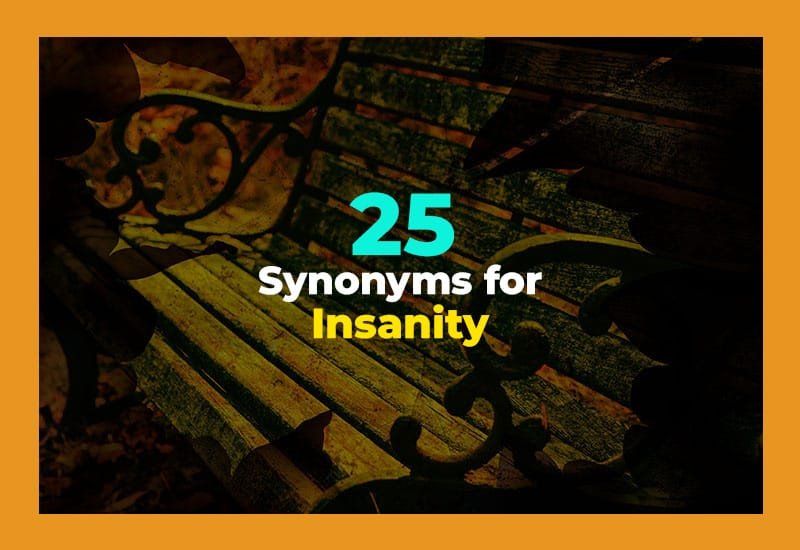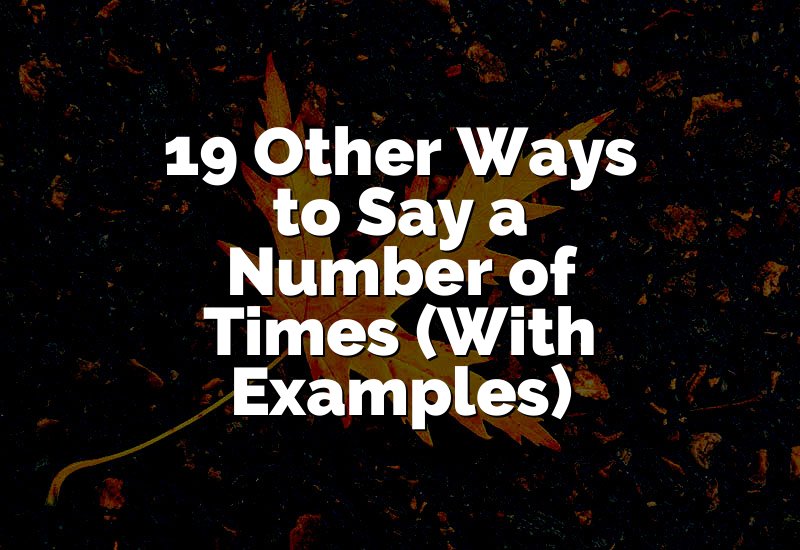Talking about mental chaos or extreme craziness can be tricky, but there are many words that capture the idea of insanity. Words like madness, lunacy, and frenzy can describe situations or behavior that feel completely out of control. In this article, we'll explore 25 great alternatives for insanity and show how to use them in everyday conversations or writing.
25 Different Ways to Say INSANITY: Another Word for INSANITY
Madness
Madness is one of the most well-known words to describe insanity. It often refers to behavior that seems wild, uncontrolled, or unreasonable. Madness can describe both a person's actions or a situation that's chaotic. It is perfect for storytelling or when you want to express shock about extreme behavior. Use it in dramatic moments or even humorously when someone acts over-the-top.
- She laughed so hard it was pure madness.
- The city streets were in madness during the parade.
- His obsession with the project drove him to madness.
Lunacy
Lunacy comes from the old belief that the moon could influence mental stability. It is often used to describe foolish or crazy actions that are almost unbelievable. Lunacy works when talking about extreme decisions or when someone behaves wildly. It adds a slightly playful or historical touch to writing or speech.
- Jumping off the roof was pure lunacy.
- Their plan to finish in one day showed lunacy.
- Driving in that storm was total lunacy.
Craziness
Craziness is a versatile word for any wild or unusual behavior. It can describe moments of excitement or frustration and works in both positive and negative contexts. It is great for casual storytelling or describing unexpected situations. This word makes situations feel more alive and expressive.
- The festival was full of craziness.
- He showed craziness when dancing in public.
- That rollercoaster ride was pure craziness.
Derangement
Derangement focuses more on mental disorder or confusion. It is best used in serious contexts or when referring to someone who is deeply disturbed. This word adds weight and intensity when describing mental instability or chaotic thinking.
- His obsession caused complete derangement.
- The old diary revealed derangement in his thoughts.
- Political debates sometimes seem full of derangement.
Psychosis
Psychosis is a medical term used for serious mental disturbances. It describes a loss of contact with reality, such as hallucinations or delusions. Using psychosis can clarify that the situation involves mental health concerns, and it adds precision when needed.
- She suffered psychosis after the accident.
- His dreams became a mix of psychosis and imagination.
- The movie portrayed psychosis in a striking way.
Frenzy
Frenzy refers to wild, uncontrolled excitement or activity. It works well when describing crowds, emotions, or extreme reactions. It brings energy to a situation and makes actions feel intense and overwhelming.
- The fans went into a shopping frenzy.
- He worked in a frenzy to meet the deadline.
- The animals ran in a feeding frenzy.
Mania
Mania indicates intense enthusiasm or obsession. It is often used for high-energy, excessive behavior, and can describe both mental health conditions and hobbies. Using mania gives a sense of extreme passion or intensity.
- He approached collecting stamps with mania.
- The sports fans were in a mania.
- She worked on the project with total mania.
Hysteria
Hysteria is a state of extreme emotional outburst. It is often linked to panic, fear, or uncontrollable laughter. Hysteria adds drama or humor depending on context and works well for describing group reactions.
- The announcement caused public hysteria.
- Children ran around in hysteria during the game.
- She laughed in hysteria at the joke.
Delirium
Delirium describes confusion mixed with excitement or agitation. It often refers to feverish, dreamlike, or panicked states. Delirium works in storytelling, medical contexts, or to describe wild experiences.
- He spoke in delirium after the injury.
- The fans were in delirium after the win.
- She wandered in delirium through the city streets.
Dementia
Dementia is a medical term for severe cognitive decline. It focuses on memory loss, confusion, and altered thinking. Using dementia emphasizes the seriousness of mental instability in older adults or in medical discussions.
- The patient showed signs of dementia.
- Her forgetfulness hinted at dementia.
- He cared for his grandmother with dementia.
Unreason
Unreason points to behavior that lacks logic or sense. It is useful for describing actions or arguments that are irrational. This word can highlight how choices defy common sense without being harsh.
- His unreason led to arguments.
- The policy was based on pure unreason.
- She reacted with unreason to the news.
Irrationality
Irrationality focuses on decisions or thoughts that ignore logic. It is ideal for academic, professional, or reflective writing. It shows that behavior is unreasonable without implying mental illness.
- The plan was full of irrationality.
- Arguments often show irrationality under stress.
- His fear of cats revealed irrationality.
Folly
Folly refers to foolishness or lack of good judgment. It can describe actions that are amusingly or tragically foolish. Folly works in storytelling, humor, or historical contexts.
- Investing everything was sheer folly.
- Their trip without preparation was folly.
- Building a tower of cards showed folly.
Fatuity
Fatuity describes silly or pointless actions. It is slightly formal and can add a literary feel. Using fatuity emphasizes the ridiculousness of behavior rather than mental disorder.
- His constant boasting was fatuity.
- The meeting was full of fatuity.
- She laughed at her own fatuity.
Absurdity
Absurdity focuses on ridiculous, illogical, or unreasonable situations. It highlights how strange or laughable something is. This word works well in humorous writing or critique.
- The idea's absurdity was obvious.
- He couldn't stop laughing at absurdity.
- Everyday life sometimes holds absurdity.
Wildness
Wildness conveys uncontrolled energy or chaos. It works for describing nature, behavior, or events. Using wildness creates a vivid sense of unpredictability and excitement.
- The forest's wildness amazed him.
- Children played with wildness in the park.
- His creativity showed wildness.
Bedlam
Bedlam describes chaos, noise, and disorder. Originally linked to an asylum, it now conveys extreme confusion or commotion. Bedlam is perfect for dramatic storytelling or describing hectic places.
- The market descended into bedlam.
- The classroom was complete bedlam.
- Fans caused bedlam at the concert.
Freneticism
Freneticism is intense, frantic activity or energy. It emphasizes fast-paced, uncontrolled movement. This word works well for describing action-packed scenarios or emotional intensity.
- The office was full of freneticism before the deadline.
- Children's games showed freneticism.
- The city morning had pure freneticism.
Overexcitement
Overexcitement shows extreme enthusiasm or agitation. It is ideal for children, pets, or high-energy situations. This word makes moments feel lively and intense.
- The puppy wagged tail in overexcitement.
- Fans cheered in overexcitement.
- She prepared for the trip with overexcitement.
Mental Instability
Mental instability refers to fluctuating moods or erratic behavior. It is useful in psychological contexts or descriptions of unpredictable behavior. It adds clarity without being informal.
- His mental instability caused concern.
- The character showed mental instability throughout the story.
- The decision reflected mental instability.
Aberration
Aberration describes a deviation from normal behavior or expectation. It is great for formal writing or describing unusual actions. Aberration emphasizes something unusual rather than permanent disorder.
- The sudden outburst was an aberration.
- Her behavior was an aberration from the norm.
- The storm was an aberration in summer.
Obsession
Obsession shows intense focus or fixation. It can refer to harmless hobbies or extreme preoccupation. Using obsession conveys strong emotion or commitment.
- His obsession with books was evident.
- She had an obsession with organization.
- Fans' obsession with the singer grew daily.
Neuroticism
Neuroticism points to anxiety, worry, or emotional instability. It is often used in psychology or personality descriptions. It helps convey sensitivity or nervousness in a clear way.
- His neuroticism made him check doors repeatedly.
- Neuroticism affected her social life.
- The character's neuroticism added humor.
Insaneness
Insaneness is another direct way to say insanity. It is flexible for both casual and dramatic descriptions. This word emphasizes extreme behavior or irrational actions.
- The project's deadline caused insaneness.
- Her reaction showed complete insaneness.
- Riding the waves in storm was pure insaneness.
Extreme Foolishness
Extreme foolishness highlights lack of judgment or irrationality. It is clear and understandable, great for emphasizing silly or reckless behavior.
- Spending all money on candy was extreme foolishness.
- Ignoring advice led to extreme foolishness.
- Building a raft in the storm showed extreme foolishness.
Synonym Table
| Synonym | Example |
|---|---|
| Madness | She laughed so hard it was pure madness. |
| Lunacy | Jumping off the roof was pure lunacy. |
| Craziness | That rollercoaster ride was pure craziness. |
| Derangement | His obsession caused complete derangement. |
| Psychosis | She suffered psychosis after the accident. |
| Frenzy | The animals ran in a feeding frenzy. |
| Mania | He approached collecting stamps with mania. |
| Hysteria | Children ran around in hysteria during the game. |
| Delirium | The fans were in delirium after the win. |
| Dementia | Her forgetfulness hinted at dementia. |
| Unreason | His unreason led to arguments. |
| Irrationality | Arguments often show irrationality under stress. |
| Folly | Investing everything was sheer folly. |
| Fatuity | The meeting was full of fatuity. |
| Absurdity | The idea's absurdity was obvious. |
| Wildness | Children played with wildness in the park. |
| Bedlam | The classroom was complete bedlam. |
| Freneticism | The city morning had pure freneticism. |
| Overexcitement | She prepared for the trip with overexcitement. |
| Mental Instability | The decision reflected mental instability. |
| Aberration | The sudden outburst was an aberration. |
| Obsession | Fans' obsession with the singer grew daily. |
| Neuroticism | The character's neuroticism added humor. |
| Insaneness | Riding the waves in storm was pure insaneness. |
| Extreme Foolishness | Building a raft in the storm showed extreme foolishness. |

Final Thoughts
Exploring different ways to say insanity helps express emotions vividly. Each synonym offers a unique tone, from dramatic madness to playful lunacy. Using these words can make writing and conversation more expressive, relatable, and fun. Choosing the right word allows your message to hit the right emotional note every time.









